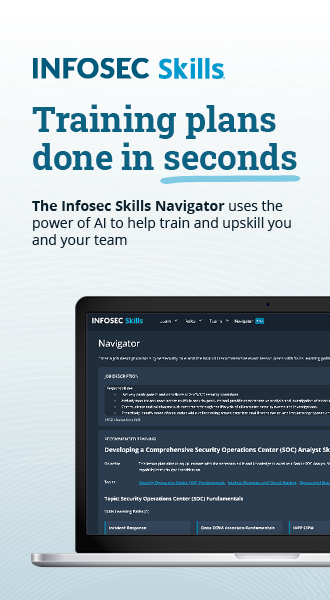Why cybersecurity is a good career for 2025: Top 10 reasons
The rising number of data breaches and threats like ransomware has created a mad dash for information security help. Organizations are scrambling to fill jobs and compete for top talent, and scores of positions have gone unfilled for months. More than 50% of organizations report unfilled cybersecurity positions, according to the 2024 ISACA State of Cybersecurity Report
This provides opportunities for those considering a first career — or looking to transition into a new career. The ISC2 Cybersecurity Workforce Study found that more than 520,000 new cybersecurity professionals are needed in North America to close the workforce gap. For those mulling over new career choices, information security could provide the next step. New professionals continue to move into cybersecurity from various backgrounds, including business and even liberal arts.
If you're considering a career in information security. Consider the following reasons that make this field enticing. You may also want to check out our free guide, "How to break into cybersecurity in under a year: A guide to career transitions."

What should you learn next?
Top 10 benefits of working in cybersecurity
1. Job prospects are excellent
Digital transformation, the Internet of Things (IoT), cloud computing and artificial intelligence (AI) — these growing trends are colliding to create a major challenge for organizations. As massive amounts of data are collected, shared and stored, every business becomes vulnerable to having the crown jewels exposed — whether that’s personally identifiable information (PII), intellectual property or other sensitive data.
Since there’s no shortage of thieves after those crown jewels, organizations of all sizes try to protect themselves the best they can. Additionally, the more mature ones have moved beyond prevention to proactively detect and predict threats. That’s where information security professionals come in. These experts are the connected world’s equivalent of knights in shining armor, and every industry needs them.
Various professions currently face a talent crunch, but few will see job growth as robust as information security.
Currently, CyberSeek (a project by the NICE and other organizations) estimates the national supply-to-demand ratio for cybersecurity workers at 85%, meaning their are only 85 trained professionals for every 100 jobs available. As the cloud, IoT, big data and other trends grow, the bad actors will find new ways to take advantage of weaknesses — which means the jobs for the defenders of all types will continue to grow.
Technology such as machine learning and automation will help solve some of the problems organizations face in protecting their data and infrastructure, but humans will not be replaced any time soon.
2. Entry-level work is available
One of the entry-level jobs many people land, information security analyst, is one of the top options to keep you employed. The U.S. Bureau of Labor Statistics projects 33% job growth over the next decade, much faster than average U.S. job roles.
According to our Cybersecurity Salary Guide, the CompTIA Security+, the most popular entry-level certification, has an average U.S. salary of $99,446. The CompTIA CySA+, most commonly held by cybersecurity analysts, has an average U.S. salary of $110,929.
For even more entry-level career options, download our free ebook, "Entry-level cybersecurity careers you should consider."
3. The upward mobility is good too
If you have a knack for managing and aren’t afraid to polish your communication and people skills, you’ll find good prospects for climbing the ladder. Sure, you’ll have to pay your dues — years of working in the field, getting some in-demand skills and certifications — but the good news is that the demand is growing for senior roles as much as it is for front-line specialists.
As we noted in our ebook covering 11 specializations to pursue in your cybersecurity career, there are many security roles to consider, from technical to non-technical. For example, there are roles related to security compliance, governance, privacy, engineering, architecture, incident response and many other areas.
4. The pay is far from modest
Pay varies quite a bit based on experience, location, job role, organization and other factors. However, the average U.S. pay for a few of the most popular certifications are listed below:
- CompTIA Advanced Security Practitioner (CASP+): $165,661
- ISACA Certified Information Security Manager (CISM): $156,420
- ISC2 Certified Information Systems Security Professionals (CISSP): $151,860
- PMI Project Management Professional (PMP): $136,121
- EC-Council Certified Ethical Hacker (CEH): $134,217
- ISC2 Certified Cloud Security Professional (CCSP): $128,811
- CompTIA Cybersecurity Analyst (CySA+): $110,929
- CompTIA Security+: $99,446
- Cisco Certified Network Associate (CCNA): $93,071
- CompTIA Network+: $89,746
For more details, download our 2024 Cybersecurity Salary Guide.

What should you learn next?
5. The job is highly portable
Perhaps surprisingly to some, the area that employs the highest concentration of security talent is in Washington, D.C. — which makes sense, since it takes a small army to protect the government’s data. The demand for this job is good across the country, both on the East Coast and West Coast.
You may even be able to work remotely if you’re dreaming of the life of a digital nomad.
6. It’s not just for nerds
Many people think of hackers (ethical or otherwise) as real-life versions of Elliot Alderson — the nerdy, antisocial recluses portrayed in the TV show “Mr. Robot.” However, many cybersecurity professionals never touch a line of code or configure a server.
Just like in the medical field, information security has numerous specializations. The roles branch out from ethical hacking and digital forensics into risk management and governance. You need technical savvy for all of them, of course, but you can succeed in this career even if you enter a field outside of IT.
If you want to hear from those who actually work in the field, check out the Cyber Work Podcast. Each week, a different cybersecurity professional is interviewed. It's a great way to understand the types of roles available and the day-to-day tasks they perform.
7. Work in any sector
If you grew up dreaming of some cool career like making movies, flying into space or saving polar bears, you can still contribute to those fields or many others by working in information security. With a few other exceptions, like lawyers, accountants (and perhaps movie stars), few other careers can lead to jobs in practically any sector.
You may not be setting foot in a rocket or on a movie set, but you can still be a highly valuable part of the team by protecting data and other assets for the organizations doing that work.
8. You’ll always be learning something new
Love to constantly learn new things? You’ll be doing that constantly in this job. Because the ecosystem is constantly changing and new technologies are emerging, the jobs will evolve with it, and your skills will need to adapt.
Consider what has happened in the past few years with technologies and trends like the cloud, artificial intelligence, work from home and more.
9. You’ll be doing something good
The salary is a perk, but many people are attracted to this profession because they feel they are doing something for the greater good. Expect this idea to get traction as the sector learns how to better position itself; industry leaders are working hard to show new generations what a positive impact they can make in this job.
Besides protecting organizations, information security professionals are the ones who help protect critical infrastructure as well as the privacy of the everyday consumer. If you’ve always wanted to be in a respectable and valuable profession, this one fits the bill.
10. Get a highly satisfying and interesting job
There are challenges in every profession, but cybersecurity professionals tend to enjoy their jobs. A recent ESG survey found that 80% of current professionals were either very or somewhat satisfied with their jobs. Besides compensation, factors contributing to high job satisfaction included incentives for career advancement and the business management’s commitment to cybersecurity.
If you want a career where you’re helping others and learning and growing, information security is a job for you. And if you love solving puzzles and problems, and enjoy a good challenge, the job will always be interesting.






